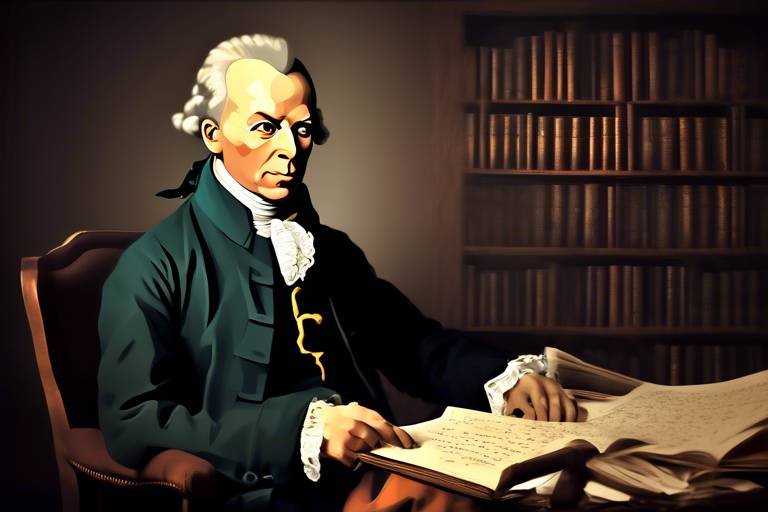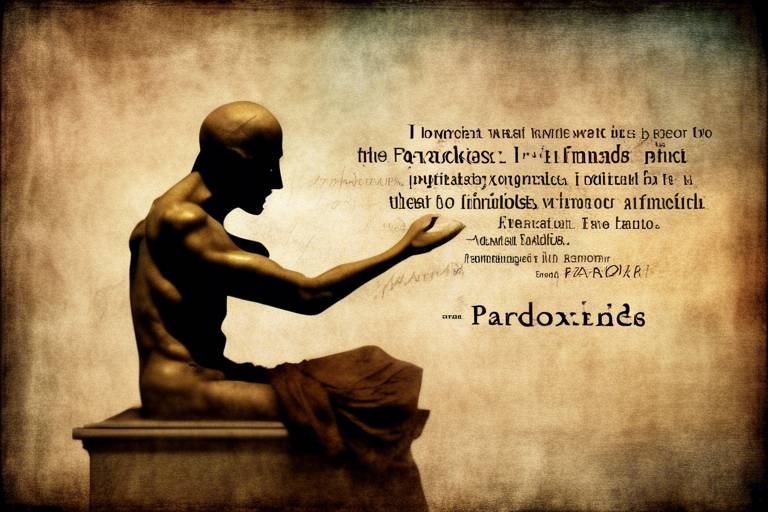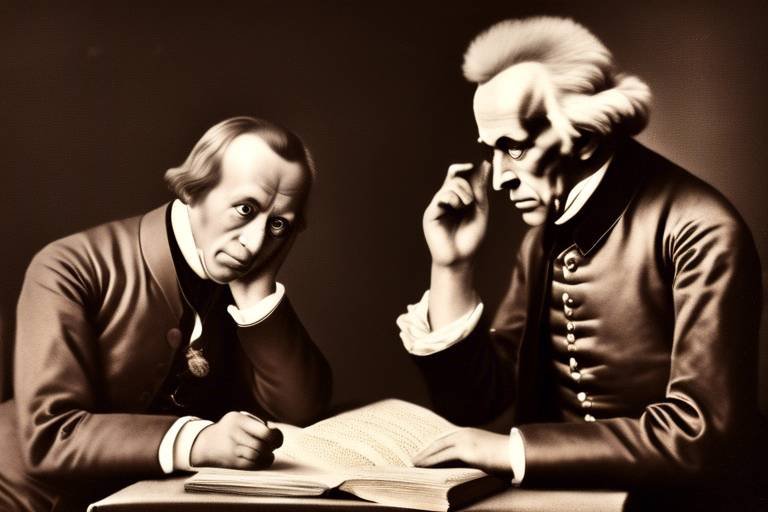Conceptual Understanding of Fundamental Principles in Philosophy
Philosophy, at its core, is an exploration of the **fundamental questions** that shape our understanding of existence, knowledge, and morality. It acts as a guiding light, illuminating the path of human thought throughout history. Imagine standing at the edge of a vast ocean of ideas, where each wave represents a different philosophical inquiry, crashing upon the shores of our consciousness. This article delves into the foundational concepts of philosophy, offering insights into how these principles influence not just academic discourse, but also our everyday lives.
Throughout the ages, philosophers have grappled with questions like: What does it mean to exist? How do we acquire knowledge? What is the nature of right and wrong? These inquiries are not merely academic; they resonate with our daily experiences and decisions. For instance, when we make choices, we often subconsciously refer to ethical principles that have been debated for centuries. Philosophy encourages us to question the status quo, to seek deeper understanding, and to challenge our assumptions.
As we navigate through this exploration, we will uncover the key philosophical theories that have emerged over time. Each theory offers a unique lens through which we can view the world, providing frameworks for understanding complex issues. From **existentialism**, which emphasizes individual freedom and the quest for meaning, to **rationalism** and **empiricism**, which debate the origins of knowledge, these theories are not just historical artifacts; they are living ideas that continue to shape our thought processes today.
Moreover, philosophy is not limited to abstract thought; it has practical implications in various fields, including politics, science, and art. For example, ethical theories such as **utilitarianism** and **deontological ethics** guide our moral decisions and influence societal norms. By examining these principles, we can better understand the ethical dilemmas we face in our personal and professional lives.
In essence, engaging with philosophy is akin to embarking on a journey of self-discovery. It invites us to reflect on our beliefs, challenge our perspectives, and ultimately, enrich our understanding of what it means to be human. So, as we delve deeper into the key philosophical theories and their implications, let us keep an open mind and a curious spirit. After all, philosophy is not just about finding answers; it's about embracing the questions that lead us to a greater understanding of ourselves and the world around us.
- What is the main purpose of philosophy? Philosophy aims to explore fundamental questions about existence, knowledge, and morality, providing frameworks for understanding complex issues.
- How does philosophy influence our daily lives? Philosophical principles guide our moral decisions and shape our understanding of the world, impacting everything from personal choices to societal norms.
- What are some key philosophical theories? Major theories include existentialism, rationalism, empiricism, utilitarianism, and deontological ethics, each offering unique perspectives on human thought and behavior.

The Nature of Philosophy
Philosophy is a fascinating field that dives deep into the fundamental questions of our existence. Think about it: every time we ponder who we are, why we are here, or what is right and wrong, we are engaging in philosophical thought. This discipline is not just a collection of theories but a vital part of the human experience, shaping how we understand the world around us. Historically, philosophy has acted as a guiding light, illuminating the path of human thought through centuries of inquiry and discussion.
At its core, philosophy is concerned with the essence of being and the nature of knowledge. It challenges us to question our beliefs and the world we inhabit. For instance, consider how philosophical inquiry has led to significant shifts in societal norms and values. The ancient Greeks, with thinkers like Socrates, Plato, and Aristotle, laid the groundwork for Western philosophy, prompting us to think critically about ethics, politics, and metaphysics.
Moreover, philosophy isn't just an academic pursuit; it's a practical tool we use every day. When we make decisions, we often weigh our options and consider the implications of our actions. This process is inherently philosophical. The questions we ask ourselves—What is the right choice?, How do I know what I know?, and What does it mean to live a good life?—are all rooted in philosophical inquiry.
To better understand the nature of philosophy, we can break it down into several key areas:
- Metaphysics: This branch explores the nature of reality, examining concepts such as existence, objects, and their properties.
- Epistemology: This area focuses on knowledge and belief, questioning how we know what we know and the limits of our understanding.
- Ethics: Ethics deals with moral principles and values, guiding our understanding of right and wrong.
- Logic: Logic is the study of reasoning, providing tools to evaluate arguments and discern valid conclusions.
These branches interconnect, creating a rich tapestry of thought that informs not just academic discourse but also everyday life. Philosophy encourages us to think critically and deeply, urging us to challenge assumptions and explore new ideas. It's about embracing uncertainty and complexity, recognizing that the world is often not black and white.
As we navigate through life, philosophy becomes an indispensable companion, helping us confront the big questions and dilemmas we face. Whether it's grappling with moral quandaries or pondering the universe's mysteries, philosophy equips us with the tools to explore our thoughts and beliefs profoundly.

Key Philosophical Theories
Philosophy is a vast and intricate field that has given rise to numerous theories, each offering unique insights into the nature of reality, knowledge, and human existence. Among the most influential philosophical theories are existentialism, rationalism, and empiricism. These theories not only shape philosophical discourse but also provide frameworks through which we can understand our lives and the world around us. By exploring these key theories, we gain a deeper appreciation of how they inform our thoughts, beliefs, and actions.
Existentialism is a philosophy that emphasizes individual existence, freedom, and choice. It posits that individuals are responsible for creating their own meaning in a seemingly indifferent universe. This theory invites us to confront profound questions about our existence: What does it mean to be alive? How do we find purpose in a world that often feels chaotic? Existentialists argue that through personal experience and introspection, we can navigate these existential dilemmas and emerge with a sense of authenticity and self-awareness.
On the other hand, rationalism and empiricism present contrasting approaches to understanding knowledge. Rationalism asserts that reason and intellect are the primary sources of knowledge. Thinkers like René Descartes championed this view, arguing that certain truths can be known independently of sensory experience. In contrast, empiricism, championed by philosophers like John Locke and David Hume, contends that knowledge arises from sensory experience and observation. This ongoing debate between rationalism and empiricism has profound implications for how we approach scientific inquiry and philosophical investigation.
To further illustrate the distinctions between these theories, consider the following table:
| Theory | Core Principles | Key Proponents |
|---|---|---|
| Existentialism | Focus on individual freedom, choice, and the search for meaning. | Sartre, Camus |
| Rationalism | Knowledge is primarily derived from reason and intellectual deduction. | Descartes, Spinoza |
| Empiricism | Knowledge is gained through sensory experience and observation. | Locke, Hume |
Each of these theories contributes uniquely to our understanding of philosophical inquiry. They challenge us to think critically about the sources of our beliefs and how we come to know what we claim to know. As we engage with these ideas, we realize that philosophy is not just an abstract discipline; it is a practical framework that can guide us in our everyday lives.
In summary, the exploration of key philosophical theories such as existentialism, rationalism, and empiricism reveals the rich tapestry of thought that has shaped human understanding. These theories encourage us to reflect on our existence, question the nature of knowledge, and consider the implications of our beliefs on our actions. By embracing these philosophical perspectives, we can foster a deeper connection with ourselves and the world around us, ultimately leading to a more meaningful existence.
- What is the main focus of existentialism? Existentialism primarily focuses on individual existence, freedom, and the search for personal meaning in life.
- How do rationalism and empiricism differ? Rationalism emphasizes reason as the source of knowledge, while empiricism asserts that knowledge comes from sensory experience.
- Who are some key figures in existentialism? Notable existentialist philosophers include Jean-Paul Sartre and Albert Camus, who significantly influenced contemporary thought.

Existentialism
Existentialism is a philosophical movement that dives deep into the essence of human existence. It challenges us to ponder the **profound questions** of life, such as "What does it mean to exist?" and "How do we find meaning in a seemingly indifferent universe?" Unlike traditional philosophies that often rely on abstract reasoning or universal truths, existentialism emphasizes the **individual experience** and the **freedom** that comes with it. At its core, it posits that we are not merely products of our environment or predetermined destinies; rather, we are the architects of our own lives, constantly navigating through choices that define our essence.
One of the most striking features of existentialism is its focus on **personal responsibility**. It suggests that with freedom comes the weight of responsibility, compelling us to make choices that reflect our true selves. This notion can be both liberating and daunting. Imagine standing at a crossroads, where every path leads to a different version of yourself. The existentialist perspective encourages you to embrace this uncertainty and to take ownership of your decisions.
Existentialism also grapples with the concept of **absurdity**. The world, in its chaotic and often unpredictable nature, can seem devoid of inherent meaning. Think of it as a cosmic joke—a universe that offers no clear answers, leaving us to forge our own paths. This absurdity forces us to confront our fears and anxieties, pushing us to seek out our own **purpose** amidst the chaos. It’s like trying to find a melody in a cacophony; you might have to create your own tune.
In existentialist thought, the journey of self-discovery is paramount. It emphasizes the importance of **authenticity**, urging individuals to live true to themselves rather than conforming to societal expectations. This idea resonates with many, as it encourages a life lived with intention. By embracing our individuality, we can cultivate a deeper understanding of ourselves and the world around us.
Existentialism has had a significant impact on various fields, including literature, psychology, and theology. Notable existentialist thinkers, such as Jean-Paul Sartre and Albert Camus, have explored these themes in their works, prompting readers to reflect on their own existence. Sartre famously declared that "existence precedes essence," suggesting that we are not born with a predetermined purpose; instead, we must carve out our own meaning through our choices and actions.
To further illustrate the core principles of existentialism, here’s a brief overview of its key tenets:
| Core Principle | Description |
|---|---|
| Freedom | The belief that individuals have the power to make their own choices and shape their destinies. |
| Absurdity | The recognition that life can be chaotic and devoid of inherent meaning. |
| Authenticity | The pursuit of living a life true to oneself, rather than conforming to societal norms. |
| Responsibility | The understanding that individuals must take responsibility for their actions and choices. |
In conclusion, existentialism invites us to embark on a journey of self-exploration and reflection. It challenges us to confront the complexities of existence and to embrace the freedom that comes with it. By understanding and integrating these principles into our lives, we can navigate the intricacies of the human experience with greater clarity and purpose.
- What is the main focus of existentialism? Existentialism primarily focuses on individual existence, freedom, and the search for meaning in an indifferent universe.
- Who are some key figures in existentialism? Notable existentialist philosophers include Jean-Paul Sartre, Albert Camus, and Simone de Beauvoir.
- How does existentialism differ from other philosophical movements? Unlike many other philosophical theories, existentialism emphasizes personal experience and the individual's role in creating meaning.
- What are the implications of existentialism in everyday life? Existentialism encourages individuals to take responsibility for their choices, live authentically, and confront the absurdity of existence.

Major Thinkers in Existentialism
Existentialism, a philosophical movement that emphasizes individual existence, freedom, and choice, has been shaped by several influential thinkers whose ideas continue to resonate today. Among these luminaries, Jean-Paul Sartre and Albert Camus stand out as pivotal figures, each contributing unique perspectives that have enriched the existential discourse.
Jean-Paul Sartre, often regarded as the father of existentialism, famously declared that "existence precedes essence." This means that individuals are not born with a predetermined purpose; instead, they must create their own meaning through choices and actions. Sartre's work, particularly in his seminal text Being and Nothingness, explores concepts such as freedom, bad faith, and the burden of responsibility. He argues that humans are condemned to be free, which can lead to feelings of anxiety and despair, but it also empowers individuals to shape their own destinies.
On the other hand, Albert Camus introduced the notion of the absurd, a concept that highlights the conflict between humans' search for meaning and the indifferent universe. In his famous essay, The Myth of Sisyphus, Camus uses the Greek myth of Sisyphus—who is condemned to roll a boulder up a hill only for it to roll back down—to illustrate the human condition. He suggests that while life may seem meaningless, one can find happiness and fulfillment in the struggle itself. Camus advocates for embracing the absurdity of life rather than succumbing to nihilism.
These thinkers, along with others such as Søren Kierkegaard and Simone de Beauvoir, have laid the groundwork for existential thought. Kierkegaard, often considered the first existentialist, focused on the individual's subjective experience and the importance of personal choice. Meanwhile, de Beauvoir's work, particularly The Second Sex, expanded existentialism to include feminist perspectives, exploring how societal constructs limit women's freedom and existence.
To illustrate the contributions of these major thinkers in existentialism, the following table summarizes their key ideas:
| Philosopher | Key Concept | Notable Work |
|---|---|---|
| Jean-Paul Sartre | Existence precedes essence | Being and Nothingness |
| Albert Camus | The Absurd | The Myth of Sisyphus |
| Søren Kierkegaard | Subjective truth and choice | Fear and Trembling |
| Simone de Beauvoir | Existential feminism | The Second Sex |
In conclusion, the contributions of these major thinkers have not only defined the landscape of existentialism but have also provided a framework for understanding the complexities of human existence. Their ideas encourage us to confront our freedom, embrace the absurd, and take responsibility for our choices. As we navigate our own lives, the insights from Sartre, Camus, Kierkegaard, and de Beauvoir remind us that while the quest for meaning may be fraught with challenges, it is ultimately a deeply personal journey worth undertaking.
- What is existentialism? Existentialism is a philosophical movement that focuses on individual existence, freedom, and the search for meaning in a seemingly indifferent universe.
- Who are the main thinkers in existentialism? Key figures include Jean-Paul Sartre, Albert Camus, Søren Kierkegaard, and Simone de Beauvoir, each contributing unique perspectives to existential thought.
- How does existentialism influence modern thought? Existentialism has impacted various fields, including literature, psychology, and theology, encouraging a deeper exploration of human freedom and responsibility.

Existentialism's Impact on Modern Thought
Existentialism, with its emphasis on individual freedom and the search for meaning, has profoundly shaped modern thought across various disciplines. This philosophical movement, which emerged prominently in the 20th century, challenges us to confront our existence and the choices we make. It invites us to ask difficult questions about the essence of life, urging us to find personal significance in an often chaotic world.
In literature, existential themes resonate strongly, influencing writers to explore the depths of human experience. Authors like Franz Kafka and Fyodor Dostoevsky delve into the absurdity of life and the struggle for authenticity. Their characters often grapple with existential dilemmas, reflecting the tension between societal expectations and personal desires. This literary exploration has inspired a generation of writers to embrace the complexities of the human condition, prompting readers to engage with their own existential questions.
Moreover, existentialism has made significant inroads into psychology, particularly through the development of existential therapy. This therapeutic approach emphasizes the individual's experience and the importance of personal choice, focusing on how one's freedom can be both a burden and a source of empowerment. Therapists draw on existentialist ideas to help clients navigate feelings of anxiety and despair, encouraging them to confront their existence head-on and to find meaning in their struggles.
In the realm of theology, existentialism has sparked debates on faith and the nature of God. Thinkers like Paul Tillich and Søren Kierkegaard have integrated existentialist principles into religious discourse, emphasizing the importance of personal faith and the subjective experience of spirituality. This has led to a more nuanced understanding of belief, where doubt and uncertainty are acknowledged as integral parts of the spiritual journey.
To illustrate existentialism's broad impact, consider the following table that summarizes its influence across different fields:
| Field | Impact |
|---|---|
| Literature | Exploration of absurdity and authenticity in human experience. |
| Psychology | Development of existential therapy focusing on personal choice and freedom. |
| Theology | Integration of existentialist principles into discussions of faith and spirituality. |
In conclusion, existentialism's impact on modern thought is both profound and far-reaching. It challenges us to confront our existence, encouraging a deeper understanding of ourselves and our place in the world. By engaging with existentialist ideas, we can navigate the complexities of life with greater awareness and authenticity, ultimately enriching our personal and collective experiences.
- What is existentialism? Existentialism is a philosophical movement that emphasizes individual existence, freedom, and the search for meaning in a seemingly indifferent universe.
- Who are some key figures in existentialism? Notable existentialist thinkers include Jean-Paul Sartre, Simone de Beauvoir, Albert Camus, and Søren Kierkegaard.
- How does existentialism influence modern literature? Existentialism inspires authors to explore themes of absurdity, freedom, and the quest for meaning in their characters' lives.
- What is existential therapy? Existential therapy is a psychological approach that focuses on helping individuals confront their existence, make choices, and find meaning in their experiences.

Rationalism vs. Empiricism
When diving into the depths of philosophical inquiry, one cannot overlook the profound debate between rationalism and empiricism. These two schools of thought offer contrasting views on how we acquire knowledge and understand the world around us. At its core, rationalism posits that reason and innate ideas are the primary sources of knowledge. Think of it as a mental toolkit; rationalists believe that our minds are equipped with certain fundamental concepts that help us make sense of reality, independent of sensory experience. This perspective has roots in the works of philosophers like René Descartes, who famously declared, "I think, therefore I am," emphasizing the role of thought as a pathway to truth.
On the flip side, empiricism argues that knowledge comes from sensory experience. Empiricists like John Locke and David Hume champion the idea that our understanding of the world is built upon what we can observe and experience. Imagine trying to learn about a new city; you wouldn't rely solely on maps or descriptions from others; you would explore it firsthand, absorbing the sights, sounds, and smells. This is the essence of empiricism—knowledge is grounded in tangible experiences. The debate between these two perspectives raises essential questions: Are we born with knowledge, or do we acquire it through our interactions with the world? Can we trust our senses, or are they mere illusions?
To further illustrate the differences between rationalism and empiricism, consider the following table:
| Aspect | Rationalism | Empiricism |
|---|---|---|
| Source of Knowledge | Innate ideas and reason | Sensory experience |
| Key Philosophers | René Descartes, Baruch Spinoza | John Locke, David Hume |
| View on Knowledge | Knowledge is a priori (independent of experience) | Knowledge is a posteriori (dependent on experience) |
| Example of Knowledge Acquisition | Mathematical truths | Scientific observations |
This ongoing philosophical debate has significant implications not just for theory but also for practical applications in various fields. In science, for instance, the empirical approach has led to the development of the scientific method, where hypotheses are tested through observation and experimentation. However, rationalism has also played a crucial role, particularly in mathematics and logic, where abstract reasoning is essential.
Ultimately, rationalism and empiricism are not mutually exclusive; rather, they represent two sides of the same coin. Many contemporary philosophers and scientists recognize that both reason and experience are vital in our quest for knowledge. This synthesis encourages a more comprehensive understanding of reality, inviting us to engage with the world both intellectually and experientially. So, the next time you ponder a question about existence or knowledge, ask yourself: Are you leaning more towards the rationalist perspective, or do you find yourself grounded in empirical observations?
- What is the main difference between rationalism and empiricism? Rationalism emphasizes reason and innate ideas as the primary sources of knowledge, while empiricism focuses on sensory experience as the basis for understanding.
- Can rationalism and empiricism coexist? Yes, many modern thinkers argue that both perspectives are necessary for a comprehensive understanding of knowledge.
- Who are some key figures in rationalism? Important rationalist philosophers include René Descartes and Baruch Spinoza.
- What are some examples of empirical knowledge? Scientific observations and experiments are prime examples of knowledge gained through empirical methods.

The Role of Ethics in Philosophy
Ethics, often regarded as the heart of philosophy, plays a crucial role in shaping our understanding of morality and human conduct. At its core, ethics asks the fundamental question: What is the right thing to do? This inquiry transcends cultural and temporal boundaries, making ethics a universal theme in philosophical discourse. Throughout history, philosophers have grappled with ethical dilemmas, seeking to establish frameworks that guide human behavior and decision-making. Whether we are pondering the consequences of our actions or the duties we owe to one another, ethics provides the lens through which we examine our moral compass.
One of the most compelling aspects of ethics is its ability to influence various facets of life, from personal relationships to global politics. Consider how ethical principles guide leaders in making decisions that affect millions. For instance, when a government must choose between economic growth and environmental sustainability, ethical considerations become paramount. This is where ethical theories come into play, offering diverse perspectives on how to navigate such complex situations.
To better understand the role of ethics in philosophy, we can categorize ethical theories into two primary branches: consequentialism and deontological ethics. Consequentialism, particularly in the form of utilitarianism, evaluates the morality of actions based on their outcomes. In contrast, deontological ethics emphasizes the importance of rules and duties, asserting that certain actions are intrinsically right or wrong, regardless of their consequences. These contrasting views reflect the rich tapestry of ethical thought and highlight the ongoing debates within philosophical circles.
Ethics is not merely an abstract concept; it has practical implications in our daily lives. From deciding how to treat our friends to navigating complex issues like healthcare and justice, ethical considerations shape our choices. For example, when faced with a moral dilemma, individuals often weigh their options against ethical frameworks, seeking guidance on what constitutes a just action. This process is essential for fostering a society that values integrity and accountability.
As we delve deeper into ethical theories, we encounter a variety of perspectives that challenge our understanding of morality. Let's take a closer look at two prominent ethical theories:
| Ethical Theory | Core Principles | Key Proponents |
|---|---|---|
| Utilitarianism | Maximizing overall happiness; actions judged by their consequences. | Jeremy Bentham, John Stuart Mill |
| Deontological Ethics | Emphasizes duties and rules; some actions are morally obligatory. | Immanuel Kant |
Understanding these theories not only enriches our philosophical knowledge but also equips us with the tools to engage in ethical discussions. As we navigate a world filled with moral complexities, the insights gained from these ethical frameworks enable us to articulate our values and beliefs more effectively.
In conclusion, the role of ethics in philosophy cannot be overstated. It serves as a guiding principle in our quest for understanding what it means to live a good life. By examining various ethical theories and their implications, we gain a deeper appreciation for the moral dilemmas we face daily. As we continue to explore the vast landscape of philosophical thought, let us remain committed to engaging with ethical questions, as they are essential to our development as thoughtful and conscientious individuals.
- What is the significance of ethics in philosophy? Ethics is significant because it helps individuals and societies determine what is right and wrong, guiding moral decision-making.
- What are the main types of ethical theories? The main types include consequentialism (like utilitarianism) and deontological ethics, each offering different perspectives on morality.
- How does ethics affect everyday life? Ethics influences personal choices, relationships, and societal norms, shaping how we interact with others and make decisions.

Utilitarianism
Utilitarianism is a fascinating ethical theory that evaluates the morality of actions based on their consequences. At its core, this principle asserts that the best action is the one that maximizes overall happiness or utility. Imagine a scale where one side represents happiness and the other side represents suffering; utilitarianism aims to tip the scale in favor of happiness. This approach is often summarized by the phrase "the greatest good for the greatest number," which encapsulates its fundamental goal: to promote the well-being of the majority.
Developed by philosophers like Jeremy Bentham and John Stuart Mill, utilitarianism provides a pragmatic framework for moral decision-making. Bentham introduced the concept of the "hedonic calculus," a method for measuring pleasure and pain to determine the most beneficial action. He believed that all pleasures could be quantified and compared, allowing individuals to make decisions that would lead to the maximum amount of happiness. Mill, on the other hand, refined this idea by emphasizing qualitative differences in pleasures, arguing that some forms of happiness (such as intellectual fulfillment) are superior to others (like mere physical pleasure).
Utilitarianism has profound implications not only for individual choices but also for societal policies and laws. For instance, when a government considers implementing a new healthcare policy, a utilitarian approach would evaluate the potential outcomes for the population. Would this policy increase overall happiness? Would it alleviate suffering? These questions guide policymakers in making decisions that aim to benefit the most people possible, illustrating how utilitarianism extends beyond personal ethics into the realm of public governance.
However, utilitarianism is not without its critics. One major concern is that it can lead to morally questionable outcomes. For example, if sacrificing one innocent person could save a hundred others, a strict utilitarian might argue that the sacrifice is justified. This raises ethical dilemmas about justice and individual rights. Critics argue that such scenarios highlight the potential for utilitarianism to overlook the intrinsic value of individuals and their rights, leading to a dangerous precedent where the ends justify the means.
Despite these criticisms, utilitarianism remains a powerful framework for ethical analysis. It encourages us to consider the broader impact of our actions and promotes a sense of responsibility towards others. In everyday life, we often engage in utilitarian thinking, whether we realize it or not. For instance, when deciding whether to donate to charity, we might weigh the potential benefits to those in need against our own financial comfort. This practical application of utilitarian principles demonstrates its relevance in contemporary moral discussions.
In conclusion, utilitarianism offers a compelling, albeit complex, approach to ethics that emphasizes the importance of outcomes in moral reasoning. By focusing on the greater good, it challenges us to think critically about our choices and their implications for society as a whole. As we navigate the moral landscape of our lives, the principles of utilitarianism can serve as a guiding light, prompting us to consider not just our own happiness, but the happiness of all.
- What is the main idea of utilitarianism? Utilitarianism posits that the best action is the one that maximizes overall happiness or utility.
- Who are the key philosophers associated with utilitarianism? Jeremy Bentham and John Stuart Mill are the most prominent figures in the development of utilitarian thought.
- What are some criticisms of utilitarianism? Critics argue that it can justify morally questionable actions and overlook individual rights in favor of the greater good.
- How is utilitarianism applied in real life? It influences decision-making in various fields, including public policy, healthcare, and personal ethics.

Deontological Ethics
Deontological ethics, often associated with the German philosopher Immanuel Kant, is a fascinating and complex area of moral philosophy that emphasizes the importance of duty and rules in ethical decision-making. Unlike consequentialist theories, which focus on the outcomes of actions, deontological ethics posits that certain actions are inherently right or wrong, regardless of their consequences. This means that the morality of an action is determined by whether it aligns with specific moral principles or duties. Imagine a world where the ends justify the means; deontological ethics challenges this notion by insisting that some actions are simply unacceptable, no matter what positive outcomes might arise from them.
At the heart of deontological ethics is the concept of the categorical imperative, a principle introduced by Kant. This imperative serves as a universal moral law that individuals must follow, acting in a way that their actions could become a universal law applicable to everyone. Kant proposed several formulations of this imperative, but one of the most compelling is the idea that we should treat humanity, both in ourselves and others, as an end in itself, and never merely as a means to an end. This principle places a significant emphasis on the inherent dignity of every individual, advocating for respect and moral consideration.
Deontological ethics is not without its challenges. Critics argue that strict adherence to rules can lead to morally questionable outcomes. For instance, consider a scenario where telling the truth could lead to harm. A deontologist would argue that one must always tell the truth, even if it results in negative consequences. This rigid adherence to duty can sometimes seem impractical in the messy reality of human life. However, proponents of deontological ethics contend that having a solid moral foundation is crucial for maintaining ethical integrity in society.
To better understand deontological ethics, it's helpful to compare it with consequentialist theories, particularly utilitarianism. While utilitarianism evaluates the morality of actions based on their outcomes—aiming for the greatest good for the greatest number—deontological ethics focuses on the morality of the actions themselves. Here’s a quick comparison:
| Aspect | Deontological Ethics | Consequentialism (Utilitarianism) |
|---|---|---|
| Focus | Morality of actions | Outcomes of actions |
| Key Principle | Categorical Imperative | Greatest Happiness Principle |
| Example | Always tell the truth | Lie if it leads to a better outcome |
In practice, deontological ethics can be incredibly beneficial. It provides a framework for understanding our responsibilities toward others and encourages us to act with integrity. By adhering to moral rules, individuals can foster trust and respect in their relationships, contributing to a more ethical society. Just think about it: when everyone upholds their duties, we create a more predictable and stable world where individuals can rely on one another to act ethically.
As we delve deeper into ethical theories, it becomes clear that deontological ethics plays a vital role in shaping moral philosophy. It invites us to reflect on our duties and the principles that guide our actions, serving as a reminder that morality is not just about outcomes but also about the intentions behind our actions. In a world where ethical dilemmas abound, understanding deontological ethics equips us with the tools to navigate complex moral landscapes.
- What is deontological ethics? Deontological ethics is a moral philosophy that emphasizes the importance of duty and rules in determining the morality of actions, regardless of their consequences.
- Who is the main proponent of deontological ethics? Immanuel Kant is the most notable philosopher associated with deontological ethics, particularly through his formulation of the categorical imperative.
- How does deontological ethics differ from consequentialism? Deontological ethics focuses on the morality of actions themselves, while consequentialism evaluates actions based on their outcomes.
- Can deontological ethics lead to negative outcomes? Yes, critics argue that strict adherence to rules can sometimes result in morally questionable situations, such as telling the truth when it could cause harm.
Frequently Asked Questions
- What is the essence of philosophy?
Philosophy is all about questioning the fundamental aspects of our existence, knowledge, and morality. It's like peeling an onion; each layer reveals deeper insights into what it means to be human and how we interpret the world around us.
- How do existentialism and rationalism differ?
Existentialism focuses on individual experience and the quest for meaning, while rationalism emphasizes reason as the primary source of knowledge. Think of it this way: existentialism is like a personal journey, while rationalism is more of a structured map guiding you through the landscape of knowledge.
- Who are the major thinkers in existentialism?
Key figures include Jean-Paul Sartre and Albert Camus, who explored themes of freedom, choice, and the absurdity of life. Their ideas have left a profound mark on modern thought, influencing everything from literature to psychology.
- What is utilitarianism?
Utilitarianism is an ethical theory that suggests actions should be evaluated based on their consequences. The goal is to maximize happiness and minimize suffering, making it a practical approach to moral decision-making.
- How does deontological ethics differ from utilitarianism?
While utilitarianism focuses on the outcomes of actions, deontological ethics emphasizes the importance of rules and duties. It's like a compass that guides you to do the right thing, regardless of the consequences.
- Why is ethics central to philosophy?
Ethics helps us navigate the complex landscape of moral choices in our daily lives. It provides frameworks that guide our decisions, shaping how we interact with others and understand our responsibilities.
- Can philosophy influence everyday life?
Absolutely! The principles of philosophy can guide our thoughts and actions, helping us make sense of our experiences and the world around us. It's like having a mental toolkit that equips us for life's challenges.



















